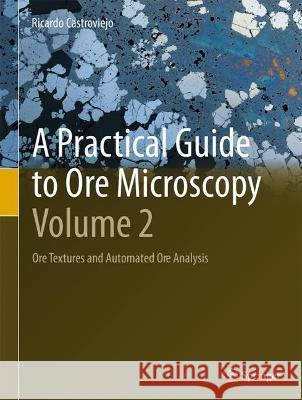A Practical Guide to Ore Microscopy--Volume 2: Ore Textures and Automated Ore Analysis » książka
A Practical Guide to Ore Microscopy--Volume 2: Ore Textures and Automated Ore Analysis
ISBN-13: 9783031189531 / Angielski / Twarda / 2023 / 242 str.
A Practical Guide to Ore Microscopy--Volume 2: Ore Textures and Automated Ore Analysis
ISBN-13: 9783031189531 / Angielski / Twarda / 2023 / 242 str.
(netto: 653,27 VAT: 5%)
Najniższa cena z 30 dni: 578,30
ok. 16-18 dni roboczych.
Darmowa dostawa!
This book presents recent developments in ore microscopy to support the work of engineers and scientists actively engaged in the field of mineral raw materials (processing plant engineers in mines, process mineralogists and chemists, exploration geologists, etc.) or in ore deposit research. Textural analysis must be rigorous, and simple to be practical. With this aim, the author proposes a specific and user-friendly systematic for textural analysis. A high-performance tool to acquire, quantify, and process the data applied for automated ore characterization is key to predict ore behavior, a fundamental aim of geometallurgy. The recently developed AMCO System (Automated Microscopic Characterization of Ores) provides the tool, first prototype available using computer vision coupled with reflected light microscopy. This innovation is introduced in the text and discussed through case studies of actual mining problems.This second volume of the book "A Practical Guide to Ore Microscopy" includes references, indexes, and other relevant information, plus Annexes 1 to 5. The latter include ore and gangue mineral indexes and mineral abbreviations (Annex 1), a brief compendium of common mineral associations in the main ore deposit types (Annex 2), an introduction to the procedures and techniques used to prepare polished sections (Annex 3), and the various tables used to identify common ores by direct microscopic observation (Annexes 4 and 5).
This book presents recent developments in ore microscopy to support the work of engineers and scientists actively engaged in the field of mineral raw materials (processing plant engineers in mines, process mineralogists and chemists, exploration geologists, etc.) or in ore deposit research. Textural analysis must be rigorous, and simple to be practical. With this aim, the author proposes a specific and user-friendly systematic for textural analysis. A high-performance tool to acquire, quantify, and process the data applied for automated ore characterization is key to predict ore behavior, a fundamental aim of geometallurgy. The recently developed AMCO System (Automated Microscopic Characterization of Ores) provides the tool, first prototype available using computer vision coupled with reflected light microscopy. This innovation is introduced in the text and discussed through case studies of actual mining problems.











